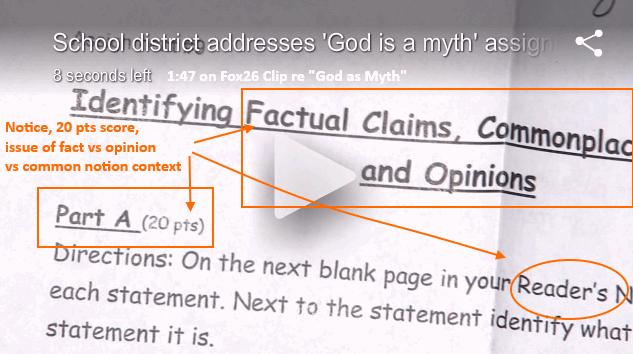Yesterday, I highlighted a case in Texas in which a School-level Critical Thinking Curriculum has been manipulated to set an assignment (in a section for 20 points) gives a question requiring the answer that “There is a God” is not fact or credible view but a cultural commonplace, poorly supported and dubious assertion that apparently students felt was effectively equivalent to “myth.”
Documents:
Today, we need to begin to address this attempt to discredit ethical theism under colours of education.
At first level, ethical theism is foundational to the charter of modern Constitutional Democracy, the US Declaration of Independence, 1776. Something that can and should be memorised by school students (and which it would be difficult indeed for educators or Courts to ban), e.g. the famous second paragraph:
>>We hold these truths to be self-evident, [cf Rom 1:18 – 21, 2:14 – 15], that all men are created equal, that they are endowed by their Creator with certain unalienable Rights, that among these are Life, Liberty and the pursuit of Happiness. –That to secure these rights, Governments are instituted among Men, deriving their just powers from the consent of the governed, –That whenever any Form of Government becomes destructive of these ends, it is the Right of the People to alter or to abolish it, and to institute new Government, laying its foundation on such principles and organizing its powers in such form, as to them shall seem most likely to effect their Safety and Happiness. Prudence, indeed, will dictate that Governments long established should not be changed for light and transient causes; and accordingly all experience hath shewn, that mankind are more disposed to suffer, while evils are sufferable, than to right themselves by abolishing the forms to which they are accustomed. But when a long train of abuses and usurpations, pursuing invariably the same Object evinces a design to reduce them under absolute Despotism, it is their right, it is their duty, to throw off such Government, and to provide new Guards for their future security . . . >>
So, we can immediately see that one reason for widespread belief in God is that historically it has been commonly understood that such belief is actually self evident and foundational to the moral order that underpins right and justice in the community. So much so, that as self-evident implies, it is felt (pretensions to erudition and brilliance notwithstanding) that to deny God as foundational to moral government is patently absurd; ending in some species or other of might and manipulation make ‘right.’
In short, we feel, inescapably, that we are under government of moral law, pointing to a final pillar of right and justice, God. Those who dismiss this typically make shipwreck of morality or try to avoid the foundations of morality, justice and law other than by trying to use the rhetoric of confident manner. The consequences of such moral nihilism and wisdom in one’s own eyes are all too sadly evident all around us in a morally increasingly bankrupt and chaotic, confused civilisation.
One needs not accept this as true, for the reasonable man to recognise that it is already evident that this is a responsible view not mere dubious popular sentiment. Mere disagreement on your part (even if dressed up in a lab coat) does not constitute “no evidence” or “no credible or respectable reason” on our part. Nor does mockery or sophomoric rhetoric suffice to undermine this point.
Mere decent respect for history and the common good sense of people should give pause.
Second, it is quite obvious that the curriculum takes dead aim at the Judaeo-Christian worldview foundations of our civilisation and so there is a right of reply as to the reason for the hope one has in the gospel. So, it is appropriate to point to the C1 historical anchorage of the Christian Faith, starting with the five hundred unshakeable witnesses to the resurrection of Jesus from the dead in fulfillment of centuries long prophecy in the scriptures of the Old Testament. A video is a useful 101 here:
[vimeo 17960119]
Again, mere disagreement on your part does not constitute what criticalthinking dot org terms :
>>cultural assumption: Unassessed (often implicit) belief adopted by virtue of upbringing in a society. Raised in a society, we unconsciously take on its point of view, values, beliefs, and practices. At the root of each of these are many kinds of assumptions. Not knowing that we perceive, conceive, think, and experience within assumptions we have taken in, we take ourselves to be perceiving “things as they are,” not “things as they appear from a cultural vantage point”. Becoming aware of our cultural assumptions so that we might critically examine them is a crucial dimension of critical thinking. It is, however, a dimension almost totally absent from schooling. Lip service to this ideal is common enough; a realistic emphasis is virtually unheard of. See ethnocentricity, prejudice, social contradiction.
prejudice: A judgment, belief, opinion, point of view — favorable or unfavorable — formed before the facts are known, resistant to evidence and reason, or in disregard of facts which contradict it. Self-announced prejudice is rare. Prejudice almost always exists in obscured, rationalized, socially validated, functional forms. It enables people to sleep peacefully at night even while flagrantly abusing the rights of others. It enables people to get more of what they want, or to get it more easily. It is often sanctioned with a superabundance of pomp and self-righteousness.
Unless we recognize these powerful tendencies toward selfish thought in our social institutions, even in what appear to be lofty actions and moralistic rhetoric, we will not face squarely the problem of prejudice in human thought and action. Uncritical and selfishly critical thought are often prejudiced.
Most instruction in schools today, because students do not think their way to what they accept as true, tends to give students prejudices rather than knowledge. For example, partly as a result of schooling, people often accept as authorities those who liberally sprinkle their statements with numbers and intellectual-sounding language, however irrational or unjust their positions. This prejudice toward psuedo-authority impedes rational assessment. See insight, knowledge>>
. . . on our part.
In the words of the Apostle Peter c 65 AD as he awaited unjust execution at the hands of Nero Caesar on the false accusation of treasonous arson against Rome on the night of July 18, 64 AD:
>>2 Pet 1:3 I think it right, as long as I am in this body,[h] to stir you up by way of reminder, 14 since I know that the putting off of my body will be soon, as our Lord Jesus Christ made clear to me. 15 And I will make every effort so that after my departure you may be able at any time to recall these things.
16 For we did not follow cleverly devised myths when we made known to you the power and coming of our Lord Jesus Christ, but we were eyewitnesses of his majesty . . . .
19 And we have the prophetic word more fully confirmed, to which you will do well to pay attention as to a lamp shining in a dark place, until the day dawns and the morning star rises in your hearts, 20 knowing this first of all, that no prophecy of Scripture comes from someone’s own interpretation. 21 For no prophecy was ever produced by the will of man, but men spoke from God as they were carried along by the Holy Spirit.>>
I hardly need to add that millions down through the ages and today jointly testify to and manifest the life transforming consequences of encounter with the Living God through penitent trust in the risen Christ.
Where, again, disagreement on your part does not constitute absence of evidence on our part of personal knowledge of God through living encounter with the risen Lord and Saviour Jesus of Nazareth, the Christ. If just one of these millions testifies truly, that is enough. And in fact there are literally millions of credible witnesses, who do not manifest the characteristically disintegrative signs of delusion.
(Nor, is it appropriate to spring an implicit, highly tendentious denunciation of the Christian worldview on twelve year olds in a classroom while using state power to lock out the right of reply by responsible and informed representatives of this major tradition. As can be seen from the common abuse of the clause of the 1st Amdt of the US Constitution that, properly understood on its history means that there is to be no State Church of the USA, via the dubious radically secularist doctrine separation of church and state, that then gives de facto establishment to the lab coat clad anti-church of evolutionary materialist scientism.)
Thirdly, we now need to begin to think in worldview terms, and to understand that worldviews stand on finitely remote first plausibles that by virtue of our circumstances must be finitely remote, should be factually adequate, logically and dynamically coherent, should not unduly beg key questions and should be explanatorily adequate — not simplistic and not an ad hoc patchwork, but powerful, balanced and elegant.
It cannot be turtles all the way down:

And so, we see the alternatives:

In this context, we all have finitely remote faith points that should be assessed on comparative difficulties, rather than being led to make snap dismissals of core propositions as popular but ill-founded notions.
Of course, a full-orbed assessment of worldviews and options, even at 101 level is beyond the typical twelve year old. That is part of why this should never have been put in such a curriculum. Indeed, such attempts will backfire, forcing church leaders to indoctrinate youngsters in the rhetoric of retort by programmed talking point backed up by instructions on referral to legal swat teams.
And again, disagreement on your part with worldview first plausibles of ethical theism in the Judaeo-Christian tradition on our part does not give reasonable grounds for holding that we have “no evidence” or no good reason.
So, already, it is quite evident that such ethical theism is not a mere culturally propagated commonplace, ill supported notion.
Okay, this is enough for a first bite at the issue. More to follow in coming days. END

